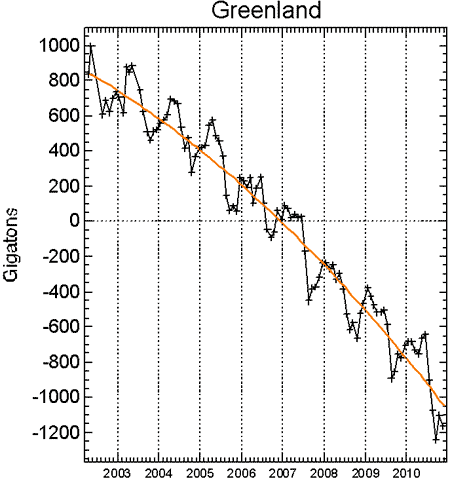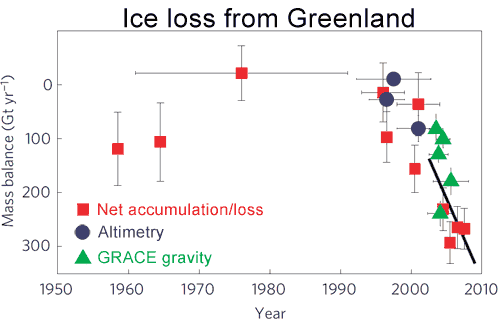
The GRACE satellites continue to measure the change in gravity around the Greenland ice sheet. Here is the latest data showing the record amount of ice loss Greenland experienced in the 2010 summer. H/T to Tenney Naumer from Climate Change: The Next Generation and Dr John Wahr at the University of Colorado who analysed the GRACE data and granted permission to reproduce it here.

Figure 1: Greenland ice mass anomaly - deviation from the average ice mass over the 2002 to 2010 period. Black line shows monthly values. Orange line shows long-term trend.
As we get into strife everytime I display this graph, I will stress that this graph shows "Ice Mass Anomaly" - the deviation from the average value over the 9 years. So when values are positive from 2002 to 2006, this doesn't mean the ice sheet is gaining ice - quite the contrary as the curve is headed downwards. It means the ice mass is above the average value over 2002 through 2010.
It's interesting to compare this data to previous blog posts in May 2010 and November 2010. The ice loss in 2010 is the greatest in the satellite record - around 600 billion tonnes of ice mass loss over the 2010 summer. More importantly, the rate of ice loss continues to increase, more than doubling since 2002.
The GRACE satellites only started recording observations in 2002. A more long-term picture is available by combining GRACE data with a range of other estimations of Greenland ice loss which give us a 50 year picture as well as a range of independent measurement techniques:

Figure 2: Rate of ice loss from Greenland. Vertical lines indicate uncertainty, horizontal lines indicate averaging time. Blue circles are from altimetry, red squares are from net accumulation/loss and green triangles are from GRACE. The black line is a straight-line (constant acceleration) fit through the mass balance data for the period 1996–2008 with a slope of 21 gigatonnes/yr2 (Jiang 2010).
Posted by John Cook on Saturday, 29 January, 2011
 |
The Skeptical Science website by Skeptical Science is licensed under a Creative Commons Attribution 3.0 Unported License. |